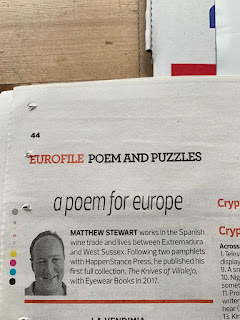While the pandemic continues to rage with no sign of any light at the end of the tunnel (in supposedly libertarian societies at least, where a political obsession with the theory of individual freedom is ironically leading to its practical curtailment), as people and poets we mistakenly feel left with a stark, binary choice: to sink or swim.
In the early stages of this phenomenon, social media was buzzing with examples of surges in creativity, of creativity being put on hold, of extreme reactions to an extreme situation. However, everything seemed temporary and sudden, something we would soon be able to place in temporal brackets. As the weeks and months go by, so we're forced to come to terms with a long-term scenario, and our mindsets consequently change.
There's one analogy that I find useful on a personal level. When I first came to Spain as a student and language assistant, I loved it. There was always a clearly defined time period for my stays and I relished the counterpoint to my life in Britain. Nevertheless, once I made the decision to move out permanently, that buffer was removed and time yawned ahead of me, vast and disorientating. I took me several months to get to grips with the waves of homesickness that hit me.
And that's what we're dealing with now: a form of homesickness and longing for our previous lives, of not knowing when they might return. This process requires us to be patient, to reset our day-to-day routines and then by extension our reading and writing. It's not a question of sinking or swimming. It's a reconciliation with ourselves.

